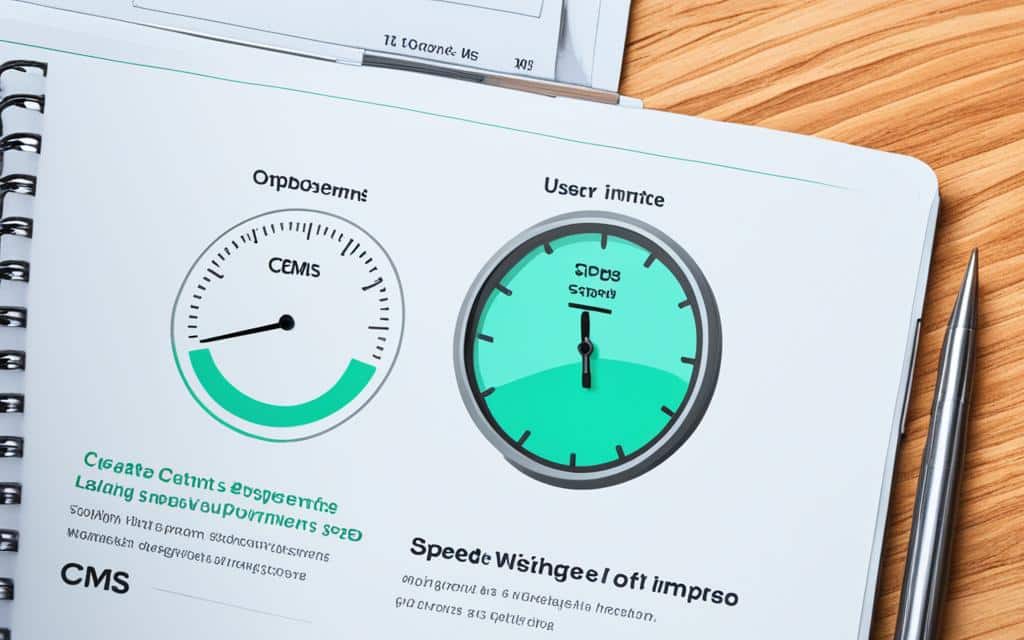Table of Contents
CMS platforms have a significant influence on the performance of websites, directly affecting site speed and user experience. The choice of CMS can determine how content is generated and delivered, with some platforms using dynamic content that requires server-side processing and others using static content that is pre-rendered.
Regularly evaluating the performance of your chosen CMS is crucial to maintaining optimal site speed and user experience. Slow loading times can lead to the loss of visitors, customers, and revenue. It is essential to optimize the CMS for speed to meet user expectations and ensure a seamless browsing experience.
In this article, we will explore the importance of website speed and user experience, as well as methods to measure and optimize CMS performance. By understanding the impact of CMS on site speed and user experience, you can make informed choices and enhance the overall performance of your website.
Understanding the Importance of Website Speed and User Experience
In today’s fast-paced digital landscape, website speed plays a critical role in shaping user experience, search engine optimization (SEO), and conversions. Users have increasingly high expectations for fast-loading websites, and any delays can lead to high bounce rates and decreased user engagement. Furthermore, search engines like Google consider page speed as a ranking factor, directly impacting a website’s visibility in search results. It is clear that website speed holds significant importance in delivering a positive user experience and improving overall SEO performance.
Having a fast-loading website is not just about meeting user expectations; it also offers several benefits that can positively impact a website’s performance. Let’s explore the key reasons why optimizing website speed is crucial for a successful online presence:
- Improved User Satisfaction: Users expect instant gratification and seamless browsing experiences. A fast-loading website enhances user satisfaction by reducing frustration and allowing them to quickly access the desired content. This leads to increased engagement, longer page visits, and higher chances of converting visitors into customers.
- Reduced Bounce Rates: Slow-loading websites often result in high bounce rates, where users quickly leave the site without further interaction. A website that loads within seconds significantly reduces the chance of visitors bouncing, increasing the likelihood of them exploring multiple pages and converting.
- Enhanced SEO Performance: Search engines prioritize websites that offer exceptional user experiences, including fast page load times. Google, for instance, has explicitly stated that page speed is a ranking factor that can influence a website’s organic visibility. By optimizing website speed, webmasters can improve their SEO performance and gain higher search engine rankings.
As evident from the above points, website speed is not a feature to be overlooked or underestimated. It directly affects user satisfaction, bounce rates, and SEO performance. Therefore, website owners and developers must prioritize optimizing website speed to ensure a seamless and gratifying user experience, leading to higher conversions and improved online visibility.
The Impact of Website Speed
Website speed is a critical factor for user experience, SEO, and conversions. Users expect websites to load quickly, and search engines prioritize fast-loading sites.\n- John Smith, SEO Expert
With the increasing prevalence of mobile browsing, website speed has become even more important. Users expect websites to load quickly on their mobile devices, and any delays can lead to frustration and abandonment. It is crucial for businesses to optimize their websites for speed to meet user expectations and stay competitive in the digital market.
Measuring and Optimizing CMS Performance for Speed
When it comes to boosting website speed and enhancing user experience, measuring and optimizing CMS performance is crucial. Fortunately, there are several tools and methods available that can help website owners achieve these goals. Some of the most prominent tools include Webpagetest, Google PageSpeed Insights, Lighthouse, and GTmetrix.
Webpagetest is a comprehensive online tool that provides detailed metrics and recommendations for improving website speed. It allows users to measure the performance of their CMS and identify areas that need optimization. Google PageSpeed Insights, on the other hand, offers valuable insights and suggestions for enhancing website speed. It also provides a user-friendly interface that displays performance scores for both mobile and desktop versions of a website.
Lighthouse, an open-source tool from Google, helps measure various aspects of website performance, including speed, accessibility, and SEO. It generates detailed reports and offers actionable recommendations to improve CMS performance. GTmetrix is another powerful tool that assesses website speed by analyzing key performance indicators and delivering valuable insights.
To optimize CMS performance for speed, website owners can take several steps. First and foremost, choosing a fast and reliable hosting provider is critical. The hosting provider plays a crucial role in determining the speed and reliability of a website. Optimizing caching mechanisms is another effective way to enhance performance. By enabling caching, the CMS can store static files and deliver them to users quickly, improving loading times and reducing server load.
“Optimizing CSS and JavaScript files through minification and compression can significantly improve website speed.”
Optimizing CSS and JavaScript files through minification and compression can significantly improve website speed. Minification involves removing unnecessary characters, such as comments and whitespace, from the code, reducing file size and improving load times. Compression, on the other hand, reduces the size of files for faster delivery.
Optimizing Images and Videos
Images and videos play a crucial role in engaging website visitors, but they can also significantly impact website speed if not optimized properly. By reducing the file size of images and videos, website owners can improve loading times without compromising visual quality. This can be achieved through image compression, resizing, and lazy loading.
“Implementing lazy loading can significantly improve website speed, especially when dealing with pages containing numerous images and videos.”
Implementing lazy loading can significantly improve website speed, especially when dealing with pages containing numerous images and videos. Lazy loading delays the loading of images and videos until they are visible on the screen, reducing the initial load and improving overall performance.
By following these optimization techniques and leveraging the power of performance measurement tools, website owners can ensure that their CMS is optimized for speed, delivering a seamless user experience and maximizing engagement.
| Performance Measurement Tool | Description |
|---|---|
| Webpagetest | A comprehensive online tool that provides detailed metrics and recommendations for improving website speed. |
| Google PageSpeed Insights | Offers valuable insights and suggestions for enhancing website speed, displaying performance scores for both mobile and desktop versions. |
| Lighthouse | Measures website performance in various aspects, including speed, accessibility, and SEO, generating reports and offering actionable recommendations. |
| GTmetrix | Analyze key performance indicators and delivers valuable insights for optimizing website speed. |
Monitoring and Assessing CMS Performance for Speed
Optimizing CMS performance for speed is an ongoing process that requires regular monitoring and assessment. Ensuring that your website’s speed meets user expectations is crucial for providing a positive user experience and improving overall site performance. Here are some effective methods to monitor and assess CMS performance:
- Use Performance Tools: Set up alerts and notifications using performance tools to receive real-time updates about potential issues affecting your website’s speed. Tools like Webpagetest, Google PageSpeed Insights, Lighthouse, and GTmetrix offer valuable insights and recommendations to optimize your CMS performance. By regularly monitoring key performance metrics, you can proactively identify any latency or speed-related issues.
- Use Analytics Tools: Utilize analytics tools like Google Analytics or Matomo to track website traffic and performance. These tools provide valuable data on user behavior, page load times, and other relevant metrics. By analyzing this data, you can identify areas where your CMS may be underperforming, allowing you to make informed optimizations to enhance speed and user experience.
- Conduct A/B Testing: A/B testing involves comparing two versions of a web page or CMS configuration to determine which one performs better in terms of speed and user experience. By conducting A/B tests, you can make data-driven decisions and identify the most effective optimizations to implement in your CMS.
- Collect User and Customer Feedback: Direct feedback from users and customers is invaluable for assessing CMS performance. Consider implementing user surveys or feedback forms to gather insights on how well your CMS is delivering a fast and seamless user experience. This feedback can help you identify any pain points or areas for improvement that may be impacting your website’s speed and usability.
By regularly monitoring and assessing your CMS performance, you can identify any speed-related issues, make informed optimizations, and ensure that your website delivers the best possible user experience. Remember, speed is paramount in today’s digital landscape, and meeting user expectations can lead to increased engagement, conversions, and overall business success.
| Benefits of Monitoring and Assessing CMS Performance for Speed | Methods |
|---|---|
| Identify potential speed-related issues | Use performance tools |
| Optimize CMS for faster loading times | Use analytics tools |
| Enhance user experience | Conduct A/B testing |
| Make data-driven decisions | Collect user and customer feedback |
Conclusion
Choosing the right CMS is crucial for achieving optimal site speed and user experience. When evaluating a CMS, factors such as speed, security, scalability, flexibility, and accessibility should be considered. By conducting user testing, monitoring performance metrics, comparing with industry benchmarks, and soliciting feedback from stakeholders, website owners and developers can effectively evaluate and improve CMS performance.
Speed optimization should be prioritized when selecting a CMS. This includes choosing a fast and reliable hosting provider, enabling caching, minifying and compressing files, optimizing images and videos, and implementing lazy loading. These steps will not only enhance site speed but also improve SEO rankings, as search engines value fast-loading websites.
By making informed choices in selecting a CMS and optimizing it for speed, website owners and developers can deliver an excellent user experience. An optimized CMS ensures quick-loading pages, reduced bounce rates, and increased engagement. Moreover, it contributes to better search engine visibility, attracting more organic traffic and potential customers.
In conclusion, by considering the key aspects of CMS performance and taking the necessary measures for optimization, website owners and developers can deliver a website that excels in both site speed and user experience. Investing time and effort in evaluating and improving CMS performance will result in a website that stands out from the competition, engages users, and drives success.
FAQ
What is the impact of CMS on site speed and user experience?
The CMS platform plays a crucial role in website performance, directly affecting site speed and user experience. The type of CMS used can influence how content is generated and delivered, with some using dynamic content that requires server-side processing and others using static content that is pre-rendered.
Why is website speed important?
Website speed is a critical factor that significantly impacts user experience, SEO, and conversions. Slow loading times can lead to high bounce rates and decreased engagement. Search engines like Google also consider page speed as a ranking factor, affecting a website’s visibility in search results.
How can I measure and optimize the performance of my CMS for speed?
There are several tools and methods available to measure and optimize CMS performance for speed. Webpagetest, Google PageSpeed Insights, Lighthouse, and GTmetrix are all free online tools that can provide detailed metrics and recommendations for improving website speed. Steps such as choosing a fast and reliable hosting provider, enabling caching, minifying and compressing files, optimizing images and videos, and implementing lazy loading can be taken.
How can I monitor and assess CMS performance for speed?
Optimizing CMS performance for speed is an ongoing process that requires regular monitoring and assessment. Setting up alerts and notifications with performance tools, using analytics tools like Google Analytics or Piwik to track website traffic, conducting A/B testing, and collecting feedback from users and customers are all effective ways to monitor CMS performance.
How do I choose the right CMS?
Evaluating the CMS based on criteria such as speed, security, scalability, flexibility, and accessibility is essential. Conducting user testing, monitoring performance metrics, comparing with industry benchmarks, and soliciting feedback from stakeholders are all valuable methods to evaluate and improve CMS performance.













